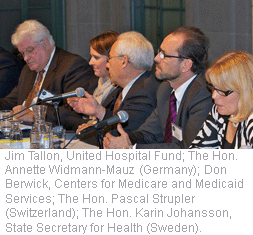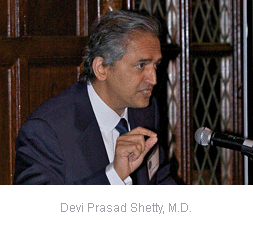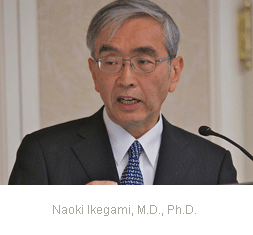The Commonwealth Fund's 14th annual International Symposium on Health Care Policy, "Achieving a High Performing and Sustainable Health Care System: Bending the Cost Curve," brought together health ministers and 65 leading policy thinkers from Australia, Canada, France, Germany, New Zealand, the Netherlands, Norway, Sweden, Switzerland, the United Kingdom, and the United States. Held in Washington, D.C., the symposium provided a stimulating and provocative forum for cross-national exchange as policymakers and experts examined different approaches being taken to address problems shared by our health care systems, and highlighted international innovations in policy and practice relevant to U.S. health reform.

A Policy Context for Survey Findings. Findings from The Commonwealth Fund's 2011 International Health Policy Survey were released at the symposium, comparing the experiences of sicker adults in 11 countries on financial barriers to care, access to care, care coordination, preventive care, and support for self-management. Among the most striking findings was the impact of having a medical home―which held across countries despite the diversity of health care systems in the study. Patients who were connected to a medical home reported more positive care experiences, including better care coordination, better communication, better support for managing their chronic illness, and fewer medical errors, and were significantly more likely to rate the quality of their care as excellent or very good. The survey findings were simultaneously published on November 9 as a Health Affairs Web First article.
In commenting on their country’s findings and providing a policy context, ministers shared key initiatives under way to improve their health system’s performance, including general practitioner-led Clinical Commissioning Groups in England, health homes in France, care coordination legislation in Norway, and patient-controlled electronic health records in Australia.
A key feature of the international symposium, the Health Ministers’ Policy Roundtable, provided the opportunity for a candid exchange among ministers on the concerns and objectives that underlie their country’s health policy agenda, and the innovative policies and programs that are moving that agenda forward. Across countries, ministers emphasized the need to measure, deliver, and internationally benchmark outcomes; redesign health care systems around the patient and establish medical homes to ensure better care coordination for chronically ill patients; and incorporate more of a population health and prevention perspective into the health system. The ministers also emphasized the need to improve quality in a budget-deficit environment. As English Secretary of State for Health Andrew Lansley, MP, said, “The fact that we live in a resource-constrained environment need not deflect us from that [improving quality and outcomes]. In fact, it should encourage us in that. And, some of exactly the same mechanisms that will deliver improving outcomes will be the mechanisms that deliver reduced costs.”
Improving the Value of Care. David Blumenthal, M.D., Samuel O. Thier Professor of Medicine and Health Policy at Harvard Medical School and chair of The Commonwealth Fund Commission on a High Performance Health System, delivered the annual John M. Eisenberg International Lecture, “Driving Health System Transformation.” Dr. Blumenthal noted the performance improvement imperative in the U.S., and laid out general principles to guide comprehensive, disciplined, and strategic implementation of all the new tools from health reform that we now have to improve health system performance. In doing so, he challenged the U.S. to double current rates of improvement in national health care quality metrics from 2.3 percent to 4.6 percent annually, and slow cost growth in health expenditures to 4.4 percent per capita (GDP plus 0.5 %) by 2016.
Drawing from the symposium theme of bending the cost curve, the rest of the program compared policies and strategies across the 11 countries for reducing the growth of health care expenditures while ensuring access, quality, and innovation. Leading international experts presented commissioned papers that examined and compared country approaches to disease management, bundled payment, and integrated care; value-based benefit design; and pharmaceutical pricing and coverage.
Pharmecutical policy offered common ground for cross-country learning. According to a paper to be published by the London School of Economics that analyzed pharmaceutical pricing and utilization for top-selling products, U.S. retail drug prices were 20 percent to 240 percent higher than prices in Germany, Switzerland, Canada, France, Australia, the U.K., and the Netherlands. Country experts, Sir Michael Rawlins of the National Institute for Health and Clinical Excellence in England, Professor Jean-Luc Harousseau of the Haute Authorité de Santé in France, Rainer Hess of the Federal Joint Committee in Germany, and Gunilla Hulth-Backlund of the Dental and Pharmaceutical Benefits Agency in Sweden, discussed how pharmaceutical policy is being used to improve pricing and access in their respective countries. The experts also discussed the policy implications of the impending shift of blockbuster drugs to off-patent, with the resulting opportunity for market competition, as well as the growing number of expensive personalized oncology medicines. International experience highlighted the trends toward use of comparative and cost-effectiveness review, reference pricing to determine the maximum cost for a drug, and value-based pricing. Other strategies include managed entry or risk-sharing agreements with coverage tied to evidence development, outcomes, and agreements to lower prices if sales are over a certain volume.

Looking beyond the core group of countries on the program, the symposium also featured India and Japan’s approaches to cost containment, ensuring value for money, and health care delivery system innovation.
Described by the Wall Street Journal as “the Henry Ford of heart surgery,” Devi Prasad Shetty, M.D., a cardiac surgeon and chair of Narayana Hrudayalaya Heart Hospital in Bangalore, India, shared insights on what industrialized countries could learn from emerging economies. Narayana Hrudayalaya is renowned for its high volume, low costs, and high quality─they perform over 3,000 coronary artery bypass graft procedures each year with an average cost of $2,000 and outcomes comparable to top U.S. hospitals. Among the strategies that Dr. Shetty argued were important in achieving these outcomes were high volume–which not only improves quality and quickens discharge, but also allows greater spread of fixed costs and purchase of supplies at a discount; use of good-enough technology, such as older CT scanners rather than the newest and most expensive machines; and a focus on daily profit and loss reports, versus the monthly and quarterly reports that are more common in other countries.

Guest speaker Naoki Ikegami, M.D., Ph.D., a health economist from Keio University, gave a plenary address, “Controlling Prices in a Multi-Payer System: Lessons from Japan.” Japan, which celebrated 50 years of universal coverage in 2011, has been successful in controlling health care spending, providing good access to care, and maintaining high levels of health care outcomes. Japan spends less than half as much per capita on health care as the U.S., and just 8.5 percent of its GDP on health care. These are notable accomplishments given Japan’s aging demographic structure and a health care system dominated by private sector delivery, no gatekeeper function, and fee-for-service payment. While Japan has more than 3,000 different health insurers, there is a single payment system, with strict cost controls provided by a uniform national fee schedule for reimbursement of drugs, devices, and medical services. The schedule is revised every two years within the overall rate of changes set by the cabinet for the nation’s health expenditures. Services and procedures with unwarranted volume growth or profit margin are targeted for price reductions. For instance, in 2005, the chronic hospital profit margin was 10 percent. Therefore chronic hospital fees were reduced by 10 percent in the 2006 revision. Further, any fee increases are offset with fee decreases to achieve target expenditures.
This year’s symposium helped fulfill the goals of the Fund’s International Program in Health Policy and Innovation: to stimulate high-level policy exchange among industrialized countries; benchmark health care system performance; encourage cross-national comparative research and collaboration; and showcase relevant international innovations in quality, health system delivery, and cost containment.
In addition to The Hon. Annette Widmann-Mauz, Parliamentary State Secretary for Health for Germany, who delivered the opening keynote address, participating ministers and senior government officials included: David Butt, Deputy Secretary, Department of Health and Ageing, Australia; The Rt. Hon. Andrew Lansley, MP, Secretary of State for Health, England; Andre Kleinmeulman, Deputy Director-General, Ministry of Health, Welfare and Sport, The Netherlands; Kevin Woods, Director-General, Ministry of Health, New Zealand; The Hon. Robin Martin Kass, State Secretary for Health and Care Services, Norway; The Hon. Karin Johansson, State Secretary for Health, Sweden; and The Hon. Pascal Strupler, Secretary of State for Health, Switzerland. Participating U.S. officials included Kathleen Sebelius, Secretary, Health and Human Services (HHS); Donald M. Berwick, M.D., Administrator, Center for Medicare and Medicaid Services; Sherry Glied, Assistant HHS. Secretary for Planning and Evaluation; Carolyn Clancy, M.D., Director, Agency for Healthcare Research and Quality; Richard Gilfillan, M.D., Director, Center for Medicare and Medicaid Innovation; and Jonathan Blum, Director, Center for Medicare Management.



